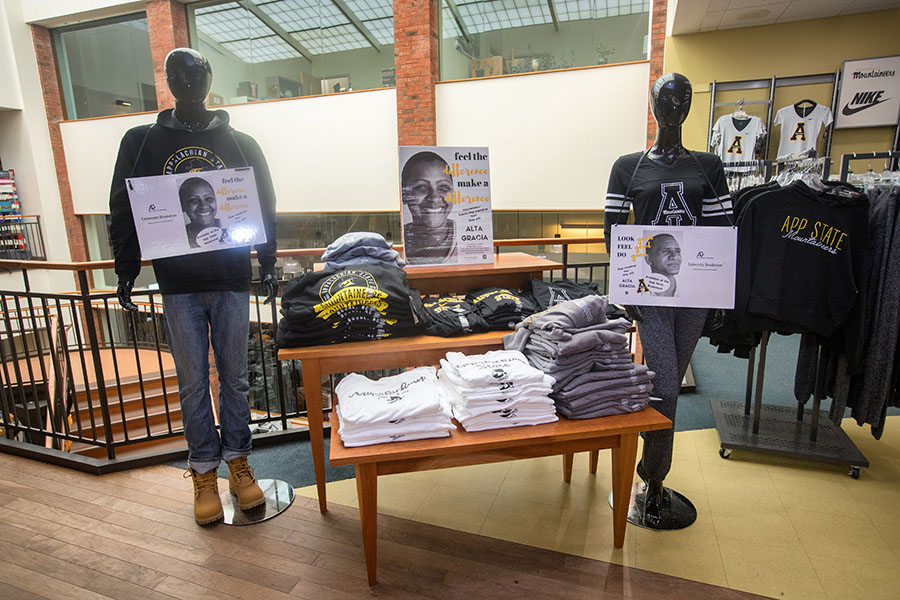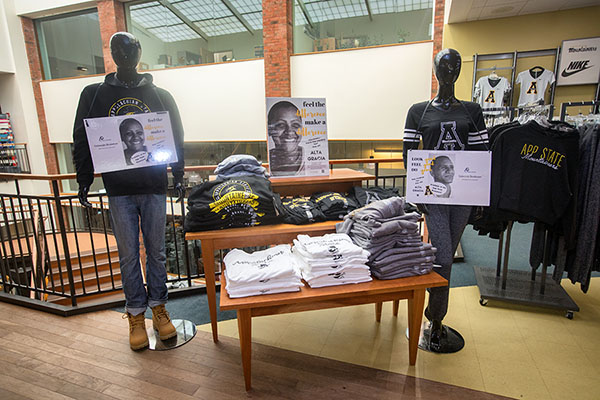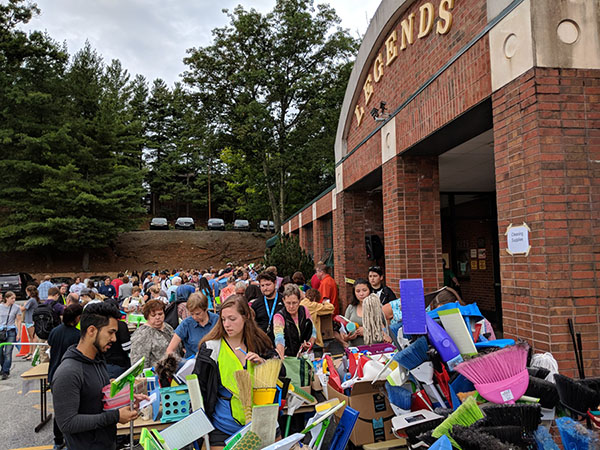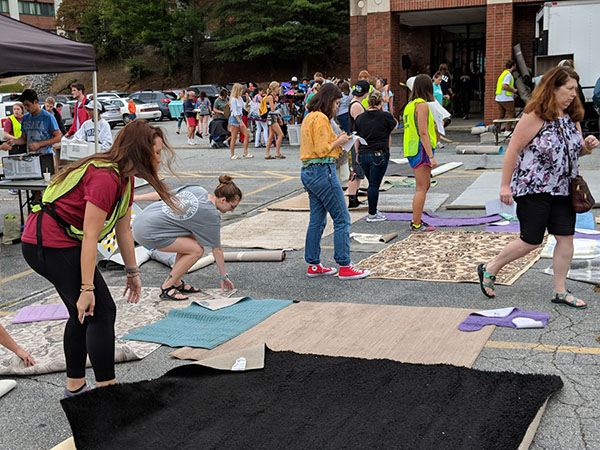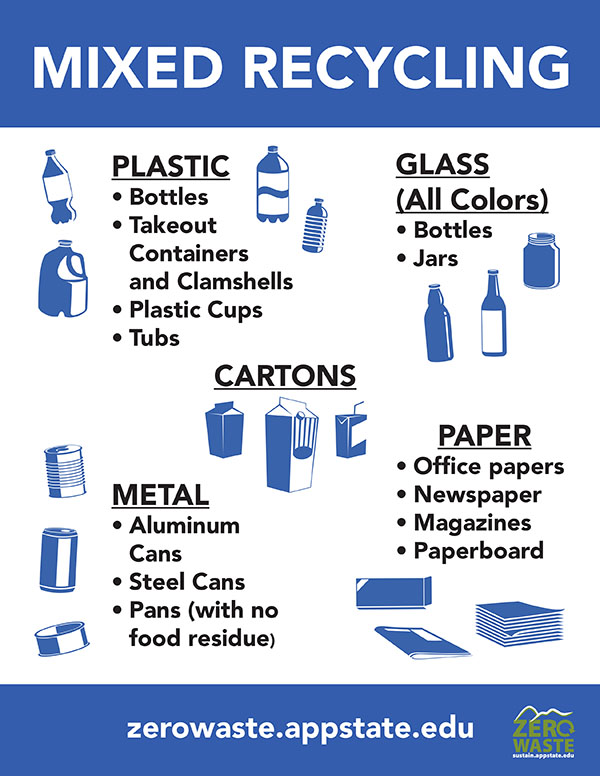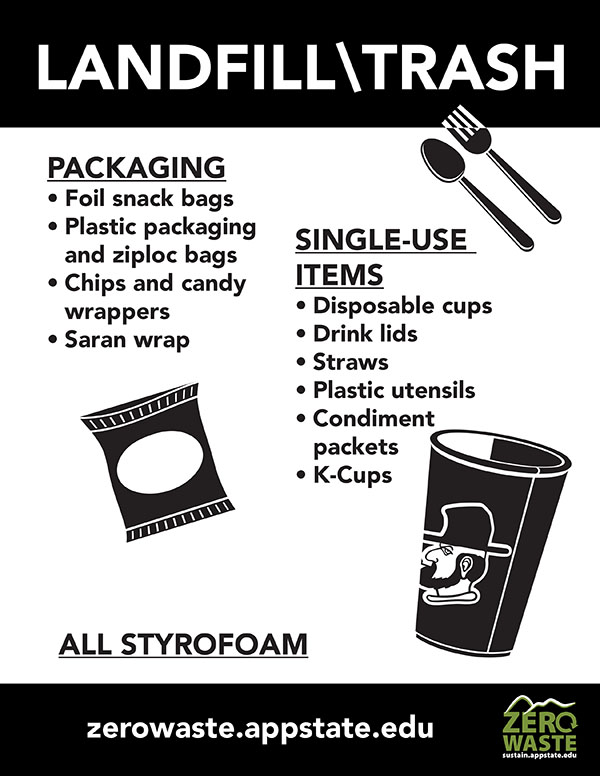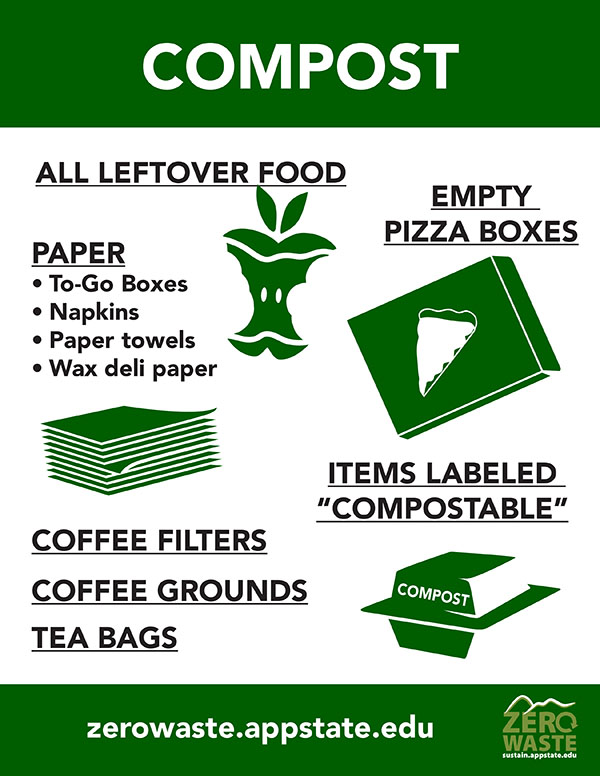BOONE, N.C. — We like to say sustainability is in our DNA at Appalachian State University. And while that’s true, it is also a conscious effort driven by the university’s strategic plan, fostered by an Office of Sustainability, included in the academic curriculum and sustained by students.
Appalachian’s leadership in sustainability is known nationally. Its holistic, three-branched approach asks members of the Appalachian Community to consider if actions are sustainable economically, environmentally and equitably in relationship to our planet’s co-inhabitants.
The following six short stories are about the latest sustainability efforts on Appalachian’s campus.
Want to learn more or get involved? Drop by Appalachian’s Office of Sustainability and become a Sustainability Ambassador. Join the university’s Renewable Energy Initiative (REI) or Team Sunergy, Appalachian’s solar vehicle team. Volunteer for one of the many nonprofits in the area. Be an Eco-Rep for a campus residence hall. Reduce. Reuse. Recycle. Compost. The opportunities are rife.
STARS from AASHE
Appalachian has earned tops spots in the Association for Advancement of Sustainability in Higher Education (AASHE) 2018 Sustainable Campus Index, which recognizes top-performing colleges and universities in 17 sustainability impact areas related to academics, engagement, operations and administration as measured by the Sustainability Tracking, Assessment & Rating System (STARS).
Appalachian placed second among overall top-performing master’s institutions. Appalachian also ranked No. 5 overall in the report’s curriculum category, earning a score of 95.6 percent out of a possible 100, and tied with California State University, Sacramento for fourth place in the buildings category.
Appalachian received its initial Gold rating from AASHE in 2012 and again in 2015. The ranking cycle occurs every three years, and Appalachian currently is in the reporting cycle for the next assessment.
Putting paper, plastic and people in place
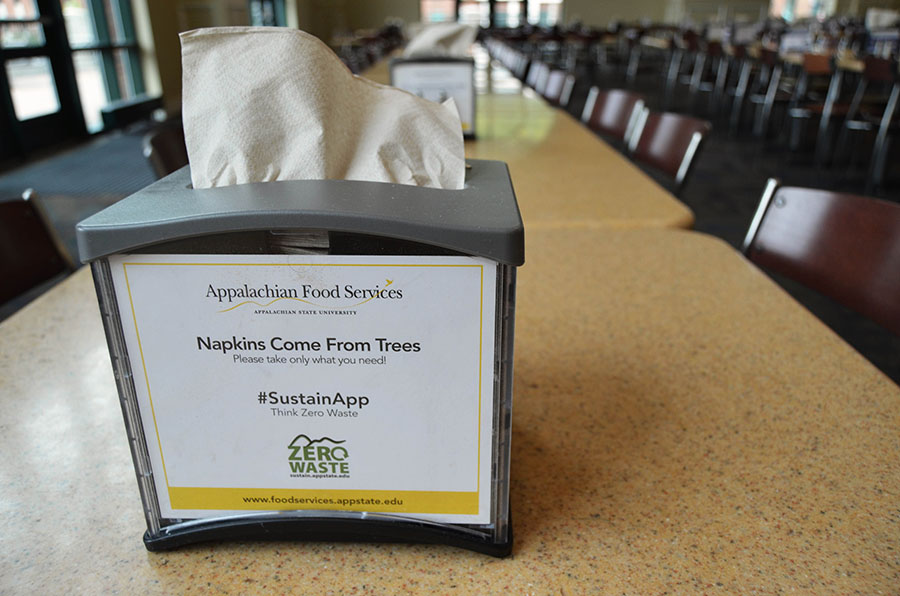
Paper napkin dispensers on the tables in Appalachian's Roess Dining Hall, such as the one pictured here, make it easier for diners to use only what they need. As a result of offering such dispensers, napkin consumption at Appalachian has been reduced by approximately 25 percent. Photo by Stephanie Sansoucy Lee
The newest initiative by Appalachian’s Food Services in reducing waste is to discourage the use of plastic straws. EarthDay.org reports millions of plastic straws are used every day in America and warns if plastic production isn’t curbed, plastic pollution will outweigh fish pound for pound by 2050.
For inveterate sippers: Biodegradable straws are available on request and reusable straws are on sale in the University Bookstore.
A move in 2015 to place paper napkins on tables, making it easier for diners to use only what they need, has reduced napkin consumption by approximately 25 percent.
The biggest impact, though, can be made through sustainable purchasing practices, Food Services Director Pam Cline said:
- 28.86 percent of the food purchased by Food Services from July 2017 to June 2018 was locally sourced.
- Styrofoam was discontinued in 2016 with a switch to paper to-go cups and boxes.
- New paper towel and soap dispensers installed in March 2017 reduce materials used and the associated environmental impacts.
- Toilet paper rolls in Roess Dining Hall are coreless.
One more sustainable factoid: Food Services employs approximately 900 people. Of these employees, approximately 500–700 are temporary positions filled by students.
‘Cool Schools’ — SIERRA magazine ranks Appalachian No. 23 out of 269 schools
This year, Appalachian moved up 17 spots for a No. 23 ranking in SIERRA magazine’s 2018 index of “Cool Schools,” released in August.
For the ninth year in a row, the magazine recognized Appalachian for helping solve climate problems, making significant efforts to operate sustainably, and shaping future environmental citizens, workers and leaders.
Appalachian received a score of 73.52 out of a possible 100 points in a field of 269 colleges and universities. The top-rated university scored 86.95 out of a possible 100 points, according to SIERRA magazine.
The annual publication measures the “greenness” of schools based on engagement in categories that include co-curricular activities, energy investments, food, innovation, academics, planning, purchasing, transit, waste and water.
In past years, SIERRA used a “snapshot” of data institutions had submitted via the Sustainability Tracking, Assessment & Rating System (STARS). In 2018, rankings were based on institutions’ existing STARS scores. Any valid STARS reports from the last three years were eligible.
Alta Gracia Apparel supports workers’ rights
Students in the campus chapter of United Students Against Sweatshops (USAS) worked with Appalachian’s University Bookstore and Office of Sustainability in spring 2018 to offer a line of collegiate apparel made by Alta Gracia, a Dominican Republic company known for offering its employees a safe, healthy workplace and a living wage.
The apparel is now being sold in the University Bookstore and reflects Appalachian’s commitment to sustainability, said Dr. Lee F. Ball Jr., chief sustainability officer at Appalachian.
“This move points out the importance of sustainability’s social equity aspect because it supports workers’ rights,” Ball said. “We all have an opportunity to make a difference, and I encourage people to think about that with their purchases.”
Mackenzie Morgan, a senior anthropology major from Charlotte, said that in championing the Alta Gracia line to Appalachian’s leadership, she and other USAS members were holding the university to its mission of creating engaged global citizens who understand their responsibilities in creating a sustainable future for all.
RELATED: The 3E’s of SustainabilityBIG Sale proceeds benefit energy efficiency at local nonprofits
A record $25,593.45 was raised to support energy efficiency projects for local community partners during the 18th annual BIG Sale held just before the start of the fall 2018 semester.
This year’s beneficiaries are Hospitality House of Boone, the Watauga Humane Society, and Horse Helpers of the High Country, which each received a grant to improve the energy efficiency of their facilities and operations. Proceeds also supported student scholarships offered through Appalachian and Community Together (ACT).
The BIG Sale is held the Saturday before the start of fall classes and features used items collected in the annual Don’t Throw it Away project held each May as students move out of residence halls. This year, the two projects diverted about 68 tons of trash from the landfill.
This year’s event drew more than 1,000 customers and over 100 volunteers. In announcing the total, ACT staff described the event as a “win-win-win” — for the earth, community and Appalachian students.
Moving forward in Zero Waste initiative
Appalachian has committed to becoming a zero waste campus by 2022 through thoughtful purchasing decisions, reducing consumption and increasing compost and recycling opportunities.
To meet this goal, Sustainability Program Manager Jen Maxwell said the Office of Sustainability is upping its game with new signage, training and education initiatives, expanded composting options and sustainable purchasing and distribution practices, like those Food Services has put in place.
“We are updating all zero-waste signage across campus and expanding composting to residence halls and some academic buildings,” Maxwell said.
Maxwell said her team would begin outreach and training for a volunteer composting program in the residence halls from mid-September through mid-October, starting on east campus and moving to west campus. The training will be conducted by peer-to-peer sustainability educators in Housing and Residence Life.
Students will be trained on what can be composted, Maxwell said, and encouraged to reuse their own waste, such as empty, lidded yogurt tubs or protein shake containers, to collect compost. The Office of Sustainability has accumulated a number of those types of containers for student use.
Compost bins will be set up in the service areas at each residence hall adjacent to the recycling and landfill dumpsters. Students will be responsible for bringing things collected as compostable waste to the bin as they do for trash and recycling, Maxwell said.
Appalachian’s compost program began as a student-led initiative by sustainable development and appropriate technology students in 1999. The pilot program began with coffee grounds, lemons and lettuce. Today, approximately 180 tons of compost are processed on campus.
Appalachian began the “Recycle at The Rock” program in 2008 by installing recycling in Kidd Brewer Stadium and having volunteers hand out bags in the parking lots for recycling and landfill collection.
In 2014, the university expanded to zero waste efforts in the stadium concourse by implementing student-staffed “Zero Waste Zones” for compost and recycling collection, averaging a 74 percent landfill diversion rate for the season. That percentage increased to 78 percent in the 2015 season, when recycling and composting efforts were expanded into the 120,000-square-foot Appalachian Athletics Center.
The average stadium landfill diversion rate in 2017 was more than 66 percent, with the best game reporting 76 percent.
Linda Coutant and Jessica Stump contributed to this report.
About Sustainability and Energy Management at App State
Appalachian State University’s leadership in sustainability is known nationally. The university’s holistic, three-branched approach considers sustainability economically, environmentally and equitably in relationship to the planet’s co-inhabitants. The university is an active steward of the state’s interconnected financial, cultural and natural resources and challenges students and others think critically and creatively about sustainability and what it means from the smallest individual action to the most broad-based applications. The university offers both undergraduate and graduate academic degree programs that focus on sustainability. In addition, 100 percent of Appalachian’s academic departments offer at least one sustainability course or course that includes sustainability, and all students graduate from programs that have adopted at least one sustainability learning outcome. Learn more at https://appstate.edu/sustainability.
About Appalachian State University
As a premier public institution, Appalachian State University prepares students to lead purposeful lives. App State is one of 17 campuses in the University of North Carolina System, with a national reputation for innovative teaching and opening access to a high-quality, cost-effective education. The university enrolls more than 21,000 students, has a low student-to-faculty ratio and offers more than 150 undergraduate and 80 graduate majors at its Boone and Hickory campuses and through App State Online. Learn more at https://www.appstate.edu.
What do you think?
Share your feedback on this story.

